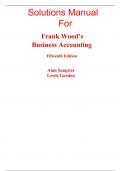Tentamen (uitwerkingen)
Solutions Manual for Frank Wood's Business Accounting 15th Edition Alan Sangster, Lewis Gordon (All Chapters, 100% Original Verified, A+ Grade)
- Vak
- Instelling
This Is Original 15th Edition of Solutions Manual From Original Author. All Other Files in the market are fake/old Edition. Other Sellers Have changed old Edition Number to new But solutions Manual is old Edition. Solutions Manual for Frank Wood's Business Accounting 15th Edition Alan Sangster, ...
[Meer zien]




